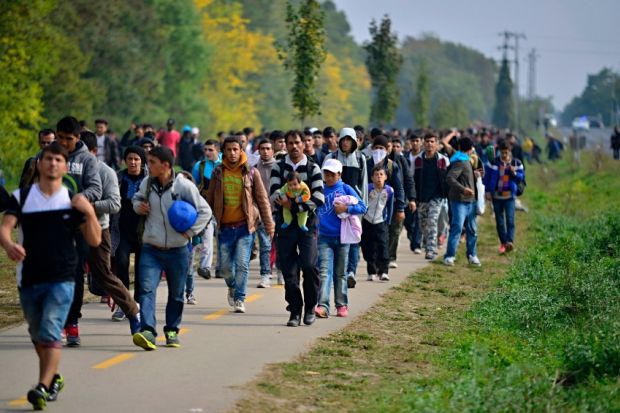Why aren't more British universities already on the ground in the Middle East, working at the heart of things with generations of disengaged young people? That's what universities should be for, not just taking on the “grand challenges” that often get dominated by industry links and research revenue streams. Yes, income and grant activity needs to be preserved but we are also here to service the social conscience of our time.
As the scale of migration in Europe has already shown, it is our problem, here and now, and only likely to get worse without active interventions. The mass movement of Syrian families may also just be the tip of the iceberg if other countries following similar patterns of political division then tip over into conflict. The tried and tested model of providing financial support to spiralling economies in developing world counties has failed, and looks unaffordable in terms of the scale of the problems involved and depth of pockets needed. In any case, cash in the form of loans was always tainted by the impression of the West taking a stronger and stronger economic grip on the region, causing pain and suffering to ensure future payback.
Universities are institutions with a mission beyond financial gain (although they clearly need to be sustainable), with an essential commitment to knowledge and social, cultural and economic development. We must have some kind of role to play in taking on the greatest grand challenge of them all.
The underlying problem for the Middle East in creating a basis for a stable future is the mass of disengaged youth, with energy, angst and no direction. When there’s little other choice, the negative channels open up all too easily and create a vacuum for others with evil intent to fill. Universities provide direction, aspiration, a structured way forward – they can offer hope of a brighter future. How would the UK and US fare without higher education, if the majority of our young people had nothing much ahead of them but unemployment or sitting in a refugee camp dreaming of a better life that is highly unlikely? We need to intervene so that we don’t create another generation that only knows of life in a refugee camp and daily handouts that barely offer subsistence.
Working out the principle is easy, the nature of the actual intervention much harder. But the UK is well placed and well-respected. We already have the respected network of British Council offices alongside the UK Trade and Investment activities. As the world changes, it’s time for the role of the British Council to perhaps evolve to one that is more reactive to evolving societal challenges that can benefit from the best of British thinking, where it can work as a platform for engagement overseas, where the disengaged benefit. Otherwise, the same problem will manifest in another form, but this time perhaps much closer to home. Taking a more active role with universities, there’s the opportunity to deliver more transnational education, opportunities for the kinds of academic study that can breed a sense of optimism, balance and new perspectives. Universities need to connect this opportunity with their founding mission and purpose of doing social, impactful good, but with perhaps more elasticity that encompasses the devastation on current generations.
The picture of extremism in the Middle East populations is complex. There’s involvement from the poor and unemployed at one end, and also the highly educated, often with science and technology backgrounds, at the other. The response needs to be a greater focus on interdisciplinary engagement where we allow different perspectives (on everything) and create an acceptance of different views.
Here, there is a clear role for universities. The combination of science, technology, engineering and mathematics (STEM) subjects with social sciences and the arts opens up different perspectives, questions of purpose, value and meaning, how different belief systems can work together in very complementary ways. Or, even more simply, get a science student together with an entrepreneur and immediately their skills and knowledge take on a different aspect – an opportunity for new enterprise, for working alongside others, for building and improving on existing technology and businesses. Using our experience of recent developments in UK offerings, programmes need be provided that have a strong basis of employability skills, tailored to actual local economies and opportunities.
My own experience, working in partnership with a university in Bahrain, has shown the particular value of opportunities for higher-level research. Students there, many of them women who wouldn’t normally have the chance in their society to undertake a British PhD, have taken the chance to explore business issues specific to their experience and their local context and the relationship to the norms of the Western world.
The long-term benefits of a shift in skills, knowledge and outlook will be far greater than any forms of pressure or coercion, an enforced and fragile stability. Education and partnership will lead to affinity. Respected bodies such as the British Council can help with access and cooperation, and on a practical level there’s a balance to be achieved in this kind of active presence in the Middle East between altruism and benefits for British higher education. It shouldn’t be the main focus, but inevitably there is the opportunity for developing a more global footprint for UK higher education, to pick up on talented students and researchers to work more closely with.
Zahir Irani is professor of sustainable business operations and founding dean of the College for Business, Arts and Social Sciences at Brunel University London.
Register to continue
Why register?
- Registration is free and only takes a moment
- Once registered, you can read 3 articles a month
- Sign up for our newsletter
Subscribe
Or subscribe for unlimited access to:
- Unlimited access to news, views, insights & reviews
- Digital editions
- Digital access to THE’s university and college rankings analysis
Already registered or a current subscriber? Login







